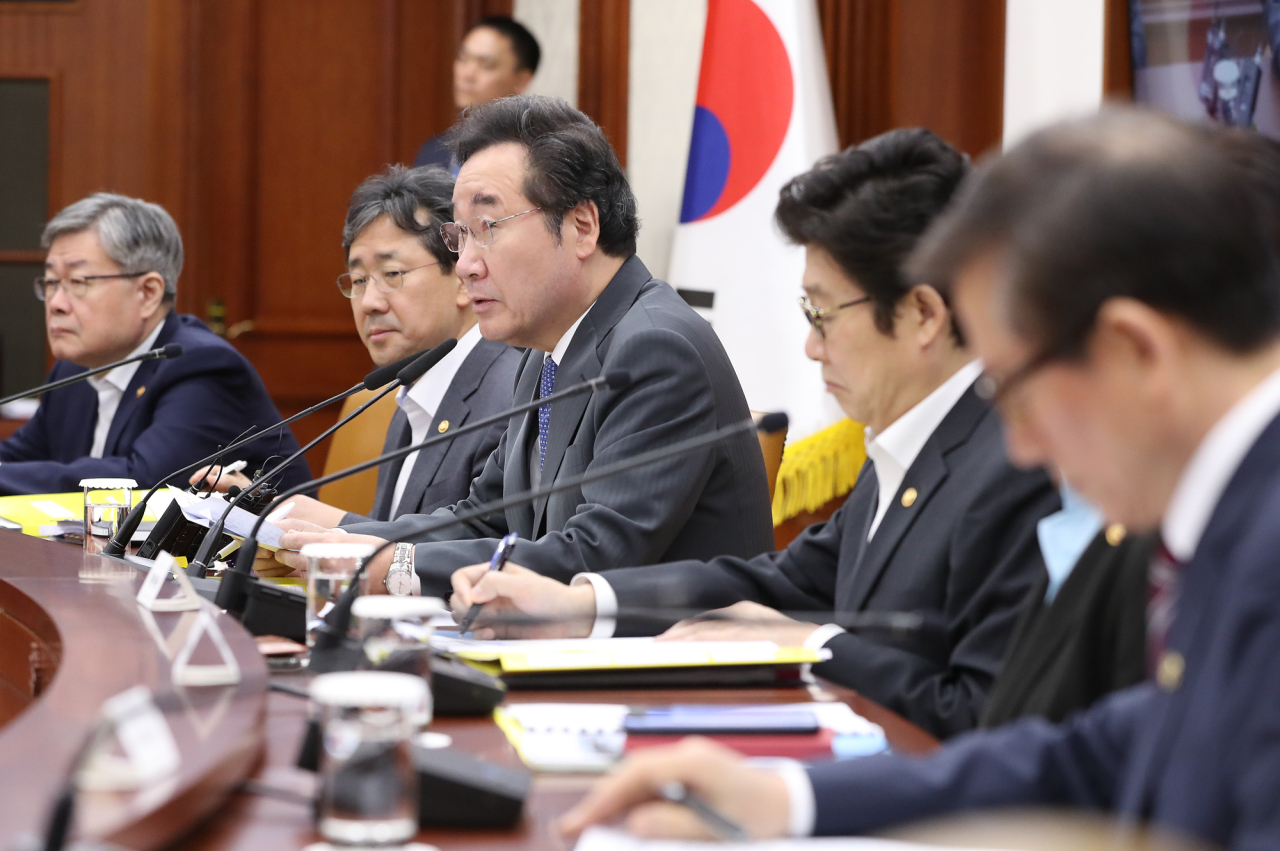Prime Minister Lee Nak-yon’s upcoming trip to Japan is raising hopes for a way out of the impasse in South Korea-Tokyo relations, but Seoul appears cautious on the outlook.
On Sunday, the Prime Minister’s Office announced that Lee will be traveling to Japan on a three-day schedule to attend the enthronement ceremony of Japanese Emperor Naruhito.
 |
Prime Minister Lee Nak-yon speaks at a government meeting on Oct. 10. Yonhap |
Lee will attend the ceremony on Oct. 22 and a banquet hosted by Japanese Prime Minister Shinzo Abe the following day.
Although Lee’s itinerary provided by Seoul did not include further details, it has been reported that a meeting between Lee and Abe is in the works. According to Japan’s NHK, the two sides are working on arranging a 15-minute meeting during Lee’s stay in Tokyo.
According to Lee’s office, as the Japanese government was formally informed of Lee’s trip on Sunday, talks for hammering out details of Lee’s itinerary -- such as who the South Korean prime minister will meet during the trip -- also began Sunday.
Sunday’s announcement came after weeks of rumors about whether President Moon Jae-in or Lee would be flying to Japan to attend the ceremony.
The plans have fanned hopes for a breakthrough in worsening Seoul-Tokyo relations, as Lee has close ties with Japanese figures.
He worked as a Tokyo correspondent for a local daily in the late 1980s. During his term in parliament, Lee also served as deputy chief of the Korea-Japan Parliamentarians’ Union in 2012. Before taking the post of prime minister, Lee served as the governor of South Jeolla Province and four terms in the National Assembly.
Meanwhile, Seoul appears to be cautiously managing expectations.
“The prime minister attending the enthronement event clearly has meaning in that it can widen the scope and level of dialogue,” a Cheong Wa Dae official said Sunday.
The official said that for Korea-Japan issues to be resolved, Japan’s trade-curbing measures must be fully withdrawn.
The Cheong Wa Dae official also reiterated that Seoul has been calling for talks with Tokyo, but Japan has been refusing requests to resolve the matter through dialogue.
“There is (significance), but it is too early to tell how much we can expect, and to achieve complete restoration, there will need to be closer communication.”
However, such an outcome appears unlikely, as the two sides’ positions on the root cause of the matter remain unchanged.
Japan’s trade curbs were enforced in retaliation against the South Korean Supreme Court’s rulings in favor of those forced into working for Japanese firms during Japan’s occupation of the peninsula.
With compensation from the concerned companies not forthcoming, the court has ordered liquidation of their Korea-based assets to raise the necessary funds.
Japan, for its part, stands by its position that all such claims were covered by the 1965 pact that normalized bilateral relations, and that the Korean court’s decision is in violation of the international agreement.
While Lee will be the highest-ranking Korean official to visit Japan since relations began to deteriorate, Seoul has reportedly been attempting to engage Tokyo by sending a number of special envoys.
According to the local daily JoongAng Ilbo, Lee confirmed related rumors at a meeting with senior political figures earlier this month.
The report said that Jung Dae-chul, a former chairman of the now defunct Millennium Democratic Party, met Lee along with a number of senior political figures on Oct. 7. At the meeting, Lee confirmed that a special envoy had been sent to Japan on at least one occasion, but declined to confirm the number of such envoys.
The daily also reported that Lee told those attending the meeting that President Moon Jae-in making the trip would be ideal, but talks on the matter appeared to have fallen through.
Jung was also quoted as saying that Lee would listen to Abe’s position on bilateral issues, as he has a close relationship with the Japanese leader.
By Choi He-suk (
cheesuk@heraldcorp.com)




![[Herald Interview] 'Trump will use tariffs as first line of defense for American manufacturing'](http://res.heraldm.com/phpwas/restmb_idxmake.php?idx=644&simg=/content/image/2024/11/26/20241126050017_0.jpg)

![[Health and care] Getting cancer young: Why cancer isn’t just an older person’s battle](http://res.heraldm.com/phpwas/restmb_idxmake.php?idx=644&simg=/content/image/2024/11/26/20241126050043_0.jpg)

